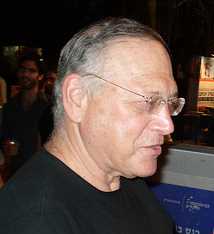Uriel Reichman
| Uriel Reichman | |
|---|---|
 | |
| Date of birth | 4 July 1942 |
| Place of birth | Tel Aviv, Mandatory Palestine |
| Knessets | 17 |
| Party represented in Knesset | |
| 2006 | Kadima |
Uriel Reichman (Hebrew: אוריאל רייכמן, born 4 July 1942) is an Israeli professor of law and former politician.
Born in Tel Aviv, during the Mandate era, Reichman studied law at the Hebrew University of Jerusalem, receiving an LLB in 1967 and an LLM in 1972. In 1975 he was awarded a JSD by the University of Chicago. Between 1985 and 1990 he worked as dean of the Faculty of Law at Tel Aviv University, before becoming dean of Ramot Mishpat.
In 2010, Prof. Reichman was awarded an honorary doctorate by Heinrich Heine University in Dusseldorf, Germany. Prof. Reichman has served on the board of directors of the First International Bank and Bank Hapoalim. He also has chaired the Israel Bar Association's Committee for Human Rights, headed and served as a member of several public committees, and proposed reforms in the real-estate laws and in the professions of real-estate surveying and brokerage.
From 1994 until the present time he is the president of the Interdisciplinary Center in Herzliya.
A founder of Shinui,[1] Reichman was elected to head the party's presidium in 2004. However, in November 2005 he left the party to join Ariel Sharon's new Kadima party. For the 2006 elections he was placed eleventh on Kadima's list, and became a Knesset member when the party won 29 seats. However, he resigned his seat on 28 April 2006 in protest at not being given the Education portfolio (which went to Yuli Tamir of the Labor Party), which he claimed he had been promised by both Ariel Sharon and Ehud Olmert.[2] He was replaced by Shai Hermesh.
References
- ↑ Lily Galili; Assaf Carmel (22 January 2006). "Shinui looking to founder Reichman and Yaakov Kedmi". Haaretz. Retrieved 13 January 2014.
- ↑ Mazal Mualem (20 April 2006). "Reichman leaves Kadima and politics; 'Olmert broke promise Sharon made'". Haaretz. Retrieved 13 January 2014.
External links
- Uriel Reichman on the Knesset website